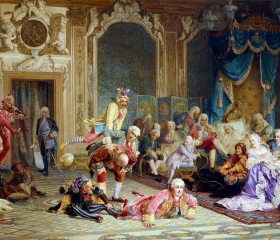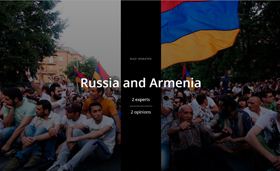MOSCOW, January 25 – RIA Novosti. Moldova is increasingly closed to journalists, both from Russia and from the European Union.
Only in the past week in the country were not allowed a dozen members of the media, including the correspondent of RIA Novosti Timur Hursandova. And it was done or no explanation, or under clearly false pretenses.
Background actions of the Moldovan authorities is obvious. In the country since last fall did not cease the protests of the left and the right of non-system opposition. Last Wednesday, the stock broke out with renewed vigor after the parliament approved a government led by a member of the Democratic Party Paul Philip. Outside the legislature, there were clashes between protesters and police, injured dozens of people. Shares of the opposition continued in the following days.
In these circumstances, Chisinau is trying to do everything to prevent “wrong” flow of information that did not correspond to its official line. Moscow has already called it a violation of freedom of speech, expressed concern and representatives of international organizations.
Moscow under special control
Particular attention is to be felt in Moscow flights Chisinau airport immediately after arrival. And this, unfortunately, is not on the hospitality.
![The building of the Russian Foreign Ministry on Smolenskaya Square in Moscow. Archival photo The building of the Russian Foreign Ministry on Smolenskaya Square in Moscow. Archival photo]()
© AP Photo / Dmitry Lovetsky
Aircraft from Russia, primarily from the capital, met in a special way. Each of the guards at this time is an employee of the Moldovan security services carefully seek out “suspicious.” For flights from other countries, as glimpsed RIA Novosti correspondent during his stay on the line of border controls, the ratio is much more relaxed.”What is the purpose of your visit?” An honest answer to this seemingly duty question, as it turned out, for you can close the entry to Moldova. After a RIA Novosti correspondent reported that he sent to the media and to Chisinau with official business to cover events in the country, he was immediately transferred from the border guards in the hands of security personnel who have long consulted and checked documents.
On many questions about what is happening and why have to wait so long, they gave an enigmatic reply: “We find out the reasons for your suspension.” As if the cause of “suspension” were not themselves.
“In principle, it is clear that I will most likely not let into the country, it became fairly quickly – after I” pulled “from the passport control, held in the luggage belt so I could pick up my suitcase and sent back behind the border “- said Khursand.
After that – about an hour, the correspondent of RIA Novosti, again without any explanation, had handed police officers who took him into the relegation zone. “Specifying management” – the only explanation that is able to get from the airport staff.
The purpose of the visit: a clear and incomprehensible?
A little later, the Moldovan authorities still issued an official explanation for the incident, although the clarity it has not made. According to the press-secretary of the border police of Moldova Dorina Chebotar journalist agencies are not allowed to enter the country because he allegedly did not have the goal of the visit to the republic.
“Indeed, arrested two foreign nationals. At the moment they are in the sterile area of the airport. They were not able to indicate the purpose of the visit to Moldova”, – she said to RIA Novosti.
Khursand, however, denied this statement. “In the area of control there are no securities, migration cards, which could be the graph” the purpose of the visit. “I once was asked this question, which I exhaustively answered. At the same time, I gave a press card, return tickets and booking confirmation hotels . No more questions about the purpose of the visit was not. I was asked whether I was ahead in Moldova, what equipment I carry. But the purpose of the visit – no more. Obviously, it was absolutely clear to the Moldovan border guards and members of the security services “, – he said .
Despite this, the decision to expel was apparently accepted almost immediately. However, waiting for sending to Moscow had a whole day. Thus at a RIA Novosti correspondent seized the passport, get it back – it is to mark that entry to Moldova has been denied – was only after his return to Russia.
![]()
© RIA Novosti. Sputnik / Miroslav Rotar
Relay for Ukraine
Meet the RIA Novosti correspondent at the ramp in Moscow, the Russian border guards – so prescribed procedures in the expulsion of the Russians from this or that country – they said that in recent days, such actions of the Moldovan side is not uncommon.
“Just for today, this is the second time within the media,” – said one of the guards.
In turn, another member of the Border Guard Service said that a similar situation has been about a year ago. Then, however, the Russians, especially journalists, are often not admitted into another country.
“At one time,” packs “issued by Ukraine, we were unable to meet. And now – from Moldova”, – said the border guard.
Conveyor banned
Refusal of entry to journalists in Moldova did put on stream. So, in October 2015, there were two cases of detention at the airport in Chisinau reporters NTV. Reporters were sent back to Moscow. In March, a film crew RTR allocated for the coverage of elections in Gagauzia, is also not allowed in Moldova.
After activating the riots in Chisinau, such cases have become frequent. On Thursday, representatives of three TV channels were denied entry to Moldova. VGTRK journalist Alexander Balitskaya denied entry to Moldova for five years. Explain their actions secret services did not, it turned out only that the reporter is in the “black list”. It has also been denied entry operator REN TV Alexander Malyshev, representatives of the First Channel Ilya Kostin and Dmitry Bedareva, crew LifeNews TV channel correspondent Cyril Olkova. Media representatives were not able to go beyond the Chisinau airport and were deported.On Friday, Moldova “closed”, including TASS photojournalist Stanislav Krasilnikov.
And on Sunday, the Moldovan authorities deported back to the Russian crew of the Russian Orthodox satellite channel “Constantinople”, which is going to prepare the material on the theme of the church in the city of Balti at the personal invitation of the local bishop.
“Suspicious Europeans”
It is noteworthy that Moldova is closed not only for Russian journalists, but also for the representatives of the Western media. So, on Friday in the country were not allowed, who arrived on the same flight with the correspondent of RIA Novosti freelance operator of the French news agency Agence France-Presse.
On the same day the employee was sent to the Czech Radio Dorazin Martin, whose only fault was, apparently, that he arrived in Chisinau from Moscow. RIA Novosti correspondent witnessed how the Czech journalist asked the employees of the Moldovan security services contact the embassy of the Czech Republic, but was rejected and was taken to a plane almost by force.
As told myself Dorazin first it was without incident. “I was asked about the purpose of the visit. I told him that I was a journalist. Print set, but then said – wait, we will take counsel,” – he said.
As a result, the expectation was spread over half an hour. “They came in the form of different people, actively counsel filmed passport” – continued the reporter. According to him, special attention to the representatives of border guards caused a Russian visa.
“I realized that they did not like the fact that I came from Moscow that work in Moscow. This caused some suspicions, I heard one say: God knows who he works for,” – said Dorazin. The journalist also demanded an accreditation document, which he could only get in person, arrived at the Foreign Ministry of Moldova.
In the end, the reporter was informed that his visa revoked. At the same time representatives of the Moldovan authorities insisted that fly from Chisinau he had been on the next flight. “I was taken to the aircraft by the different threats that may use physical violence, although I would say let’s calm, I evening flight back to Moscow, let’s be a human being” – told Dorazin.
Unacceptable restrictions on freedom
In Moscow, called such actions of Moldovan authorities against journalists unacceptable. “Assess, we can only very negatively, because, of course, any restrictions on freedom of speech on the work of the media for us, especially the Russian media, we consider unacceptable,” – said the president’s press secretary Dmitry Peskov.
“We were all witnesses of precedents in this area in neighboring Ukraine. Of course, do not want to, let’s say, the development scenario of the mass media on the same path. So, of course, we believe it is unacceptable and regret in this regard”, – he added .The Russian Foreign Ministry said it expects the reaction of international organizations. “Strongly condemn the policy of the Moldovan authorities to restrict the activities of the media and the introduction of sanctions measures against journalists. We expect appropriate assessment of the specialized institutions designed to respond to the breach of their international obligations in the field of media,” – said in a ministry statement.
Foreign Ministry spokesman stressed Maria Zakharova, the Russian journalists that the refusal of entry to Moldova violates the international obligations of the country’s authorities. “This is another confirmation of Chisinau violations of international law of human rights, freedom of speech and the fundamental principles of a democratic society”, – she said.
At the same time, she said, the actions of the Moldovan authorities – this is only part of a broader pattern. “We have repeatedly ascertain begun by and large campaign against the Russian journalists in Europe” – said Zakharov.
OSCE concerned
The negative assessment of the actions of the official Chisinau and sound from the relevant international organizations. The OSCE Representative on Freedom of the Media Dunja Mijatovic expressed concern about reports that “the Russian journalists have repeatedly been denied entry into Moldova.”
“I call on the Moldovan authorities to review the practice of restrictive and selective measures in relation to the media, the victims of the prohibition on entry, and allow all journalists to freely practice their profession”, – the press service quoted the words of the OSCE Mijatovic.
According to her, in 2015 in Moldova there were at least seven cases of such restrictions on journalists from Russian media. Mijatovic has repeatedly raised the issue with the Moldovan authorities. Then in Chisinau stated that the reason for refusal of entry is incorrect to inform border guards about the purpose of the visit by representatives of the media and propaganda.
“With all due respect for the sovereign rights of States Parties to control their borders are widely used for travel restrictions on journalists have a negative impact on the free flow of information. In addition, the use of broad and vague definition of propaganda to justify making it particularly disturbing,” – added Mijatovic.
 By
By 


 Moscow (AFP) – To reach the gigantic statue of Vladimir Lenin that overlooks Moscow’s October Square, pedestrians can stroll down streets named after the Bolshevik revolutionary’s wife or mother, or cross Lenin Avenue that intersects with a road named after his brother.
Moscow (AFP) – To reach the gigantic statue of Vladimir Lenin that overlooks Moscow’s October Square, pedestrians can stroll down streets named after the Bolshevik revolutionary’s wife or mother, or cross Lenin Avenue that intersects with a road named after his brother.











 The backdoor accounts were named Black Widow and Batman
The backdoor accounts were named Black Widow and Batman Russia is taking yet another hit, in the wallet and in bragging rights, right where they need it most.
Russia is taking yet another hit, in the wallet and in bragging rights, right where they need it most.



 Posted by:
Posted by: 









 Russia appears to be fomenting division in Germany, deliberately fanning the flames of a fake story of the rape of a young German-Russian woman.
Russia appears to be fomenting division in Germany, deliberately fanning the flames of a fake story of the rape of a young German-Russian woman.

 Russia has been sending conciliatory signals to Kyiv, but many Ukrainians are skeptical. The general consensus among Ukrainians is that a revival of the old friendship with Moscow will be difficult.
Russia has been sending conciliatory signals to Kyiv, but many Ukrainians are skeptical. The general consensus among Ukrainians is that a revival of the old friendship with Moscow will be difficult.
